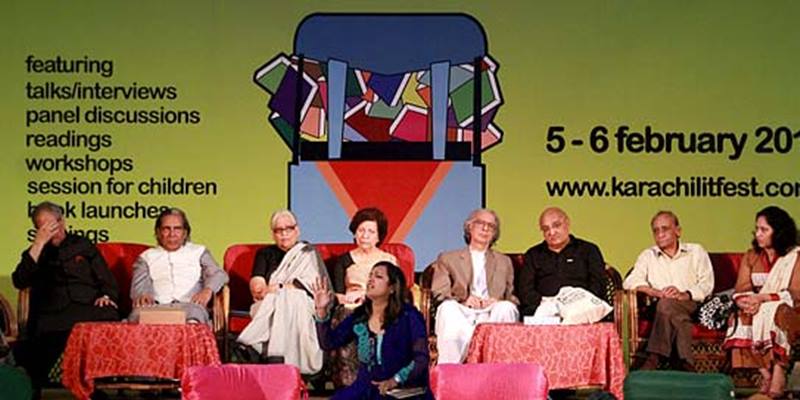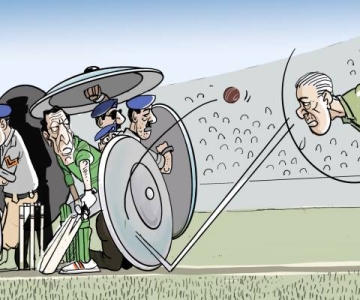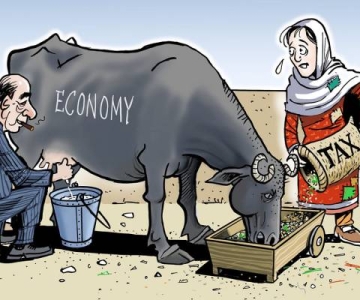By Peerzada Salman
KARACHI: A befitting and heartfelt tribute to Faiz Ahmed Faiz ended the 2nd Karachi Literature Festival at a local hotel on Sunday. But the day will also be remembered for some quality literary discussions, debates and sessions, along with the fact that a reasonable number of schoolchildren trickled into the venue to attend a storytelling session for children, which is an extremely healthy sign.
The day began with a panel discussion on Promising New Writings in English . Muneeza Shamsie pointed out that the various forms of communication (the internet, the media) had now enabled the budding authors to read contemporary books. She said there was a time when you didn`t know where to place your bilingual identity. She claimed she didn`t think that talent in that realm always existed in Pakistan. Ambreena Kazi endorsed Ms Shamsie`s opinion and added that there should be infrastructure to help young writers.
A discussion on art and literature titled Art Clouds and Word Clouds had Dr Akbar Naqvi narrate his experience that how literature helped him understand art.
Artist Noorjehan Bilgrami read out a small piece on the subject raising the question, “Can we, the artists, look at our role in society.”
Saima Zaidi talked about the correlation between words and images.
Another simultaneous panel discussion was on the subject of Writing History Without Bias in which Pervez Hoodbhoy talked about a scientific approach to history. Hamida Khuhro opined that the history of partition was emotional and prejudiced.
The launch of Sunil Sethi`s book The Big Bookshelf was moderated by Ameena Saiyid. Sunil Sethi who hosts a show Just Books on an Indian TV channel lauded the Karachi Literature Festival, saying it wasn`t like its Jaipur counterpart which had become a lunatic juggernaut.
On his book, Mr Sethi said its publishers had floated the idea that he should compile his interviews with authors into a book as a result of which The Big Bookshelf saw the light of day. He said through the book he wanted to know how the world of writers had changed and discover the contrast between young and old writers.
In the same sitting, writer Danial Moinuddin, replying to a question, said he kept two things in mind while writing a book: the intention of writing it, and hopefully someone will buy it.
Listening to the Reed was a discussion on Sufism during which Peter Pannke made an interesting observation that the survival of Sufism in this region (Pakistan) depended on Pakistanis and not on foreign scholars.
A conversation with poet Iftikhar Arif proved to be an exciting programme as he enthralled the audience with his ghazals in his inimitable style, beginning with Jaisa Hoon Waisa Kion Hoon Samjha Sakta Tha Main. The one-hour event was eloquently conducted by Dr Nomanul Haq.
Amjad Islam Amjad also recited some of his poems on the occasion.
A thought-provoking panel discussion on New and Emerging Writings in Pakistani Languages had Hassan Dars, Ali Akbar Natiq, Mudassar Aziz and Atiya Dawood as panelists, and Mohammad Hanif was the moderator.
Atiya Dawood read out a piece from her autobiography Aeney Ke Samney in which she recollected the time when she, along with her daughters and a foreign journalist, went to a remote area invoking some significant memories.
Mudassar Aziz read out a few of his Punjabi poems and informed the audience about the books that he has compiled.
A conversation with Intizar Husain, moderated by Raza Rumi, oscillated between personal reminiscences and comments on society.
Responding to Rumi`s question about the creation of Pakistan, Intizar Husain said the movement for Pakistan was a dream and it`s difficult to decipher dreams. He said at the time of partition some people had left the keys to their houses with their Hindu neighbours thinking that returning to their homes wouldn`t be a problem. He also touched upon his days when he had migrated to Lahore from Meerut and met Faiz Ahmed Faiz, and afterwards wrote an essay against Mohammad Hasan Askari after the critic had commented that literature had become stagnant.
The post-lunch events included the plenary speech titled A Charter of Compassion by Karen Armstrong.
She said, “Ego keeps us from the divine…We want other people to accept what we think. We don`t want to listen to others. We want to go into dialogue to win it. Dialogue is meant to enrich us. Dialogue between nations has to begin with absolute respect.” The hall was brimming with people during her speech.
Perhaps the most remarkable programme of the day was Readings from New Works and the launch of books by Zahida Hina, Hasan Manzar and Dr Aslam Farrukhi. All three read out from their books (Zahida Hina from her novel Na Junoon Raha Na Pari Rahi , Hasan Manzar from his forthcoming book Sajda and Aslam Farrukhi from his book of sketches of some great men of letters, Saat Aasman ).
Zahida Hina`s excerpt was about a Parsi family in old Karachi; Hasan Manzar painted a moving picture of the prevalent violent trends in society; and Dr Farrukhi drew sketches (in eloquent Urdu tinged with razor-sharp wit) of Shaikh Imam Bakhsh Nasikh and his rival Khwaja Haider Ali Atish.
Prior to the tribute to Faiz, Ameena Saiyid, Asif Farrukhi, Syed Mashhood Rizvi, Martin Fryer and Susan Harville expressed their thoughts on the festival`s success. Then the KLF Prize for Best Non-Fiction Book 2010 was announced. The winner was Ilhan Niaz`s book The Culture of Power and Governance of Pakistan (1947-2008).
The tribute to Faiz, conducted by Raza Rumi, began with reminiscence by Ali Madeeh Hashmi. Tina Sani sang a Faiz poem, followed by Ali Sethi`s introduction to the original recording of Mujh Se Pehli Si Muhabbat sung by Noor Jehan. After that Ali Sethi himself sang Faiz`s ghazals Na Ganwao Navak-i-Neem Kash (originally sung by Farida Khanum), Aey Kuch Abr , and Chand Nikley . His performance was well-received.
Zehra Nigah appeared on the stage and shared her fond memories of the great poet with the audience and rounded off her speech by reciting his quatrain Mata-i-Loh-o-Qalam Chhin Gaee Tau Kia Gham Hai .
Finally pop band Laal performed to end the festival on a melodious note.
Source: http://www.dawn.com/2011/02/07/literature-festival-ends-with-



